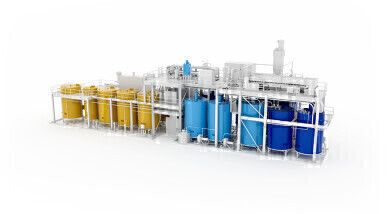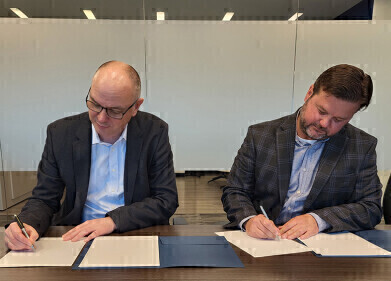Waste Management
Transforming hazardous incinerator flue gas residue from waste-to-energy plants into reusable materials.
Jun 02 2023
Emerson, is teaming up with HaloSep, a Swedish cleantech company, to optimise an innovative process that transforms hazardous incinerator flue gas residue from waste-to-energy plants into reusable materials. By deploying Emerson's cutting-edge control technology and software at HaloSep's research and technology (PORT) facility in Gothenburg, Sweden, the aim is to manage a revolutionary chemical separation process that extracts valuable salt, metals, and minerals from fly ash. This environmentally friendly approach not only offers an alternative to landfill disposal but also enhances the sustainability of the waste-to-energy sector.
The extraction of materials from challenging waste streams plays a crucial role in promoting circularity. With over 2,600 waste-to-energy plants across the globe, capable of handling around 460 million tons of municipal waste annually, approximately 2-5% of the incinerated waste is left as flue gas residue, commonly known as fly ash. Fly ash is a hazardous substance that contains contaminants like heavy metals, chlorides, and sulphates. Presently, millions of tons of fly ash are transported to landfills via trucks, railways, or ships, incurring significant costs and posing sustainability concerns.
Staffan Svensson, the President of HaloSep, highlighted the irregular nature of household waste, which results in fly ash with varying properties that require distinct separation processes. HaloSep's PORT facility will analyse fly ash samples from around the world, test specific separation processes, and demonstrate the benefits of a circular economy to potential customers. Svensson acknowledged the vital role played by Emerson's technology and expert guidance in implementing automation throughout the plant, which has been instrumental in optimising these processes. Once deployed, the optimised processes will contribute to enhancing the sustainability of the waste-to-energy industry.
Emerson has designed and implemented a scalable control system architecture at the PORT facility and collaborated closely with HaloSep to develop unique separation sequences for the efficient recycling of fly ash with diverse compositions. By utilising Emerson's DeltaV™ distributed control system, the separation processes are executed safely and efficiently. Moreover, the DeltaV Live software empowers operators with high-performance human-machine interfaces, featuring intuitive reporting and management through key performance indicator-led dashboards. These capabilities support informed decision-making and operational excellence.
Nathan Pettus, the President of Emerson's process systems and solutions business, emphasised their commitment to assisting customers in industries like plastics, lithium-ion battery manufacturing, and waste-to-energy generation. Their sustainable innovations are designed to address the evolving industrial, processing, and energy demands while minimising environmental impact. Pettus further added that Emerson's technologies and expertise are ideally suited to handle the complexities of HaloSep's recycling process.
As a subsidiary of the Stena Metall Group, HaloSep offers an on-plant solution that can be implemented locally at a waste-to-energy facility or deployed at sites where fly ash from smaller plants is consolidated. This approach eliminates the need for long-distance transportation, thereby reducing costs and emissions associated with the process.
Events
IWA World Water Congress & Exhibition
Aug 11 2024 Toronto, Canada
Aug 25 2024 Stockholm, Sweden and online
Sep 03 2024 Mexico City, Mexico
Sep 03 2024 Mexico City, Mexico
Sep 03 2024 San Diego, CA, USA













